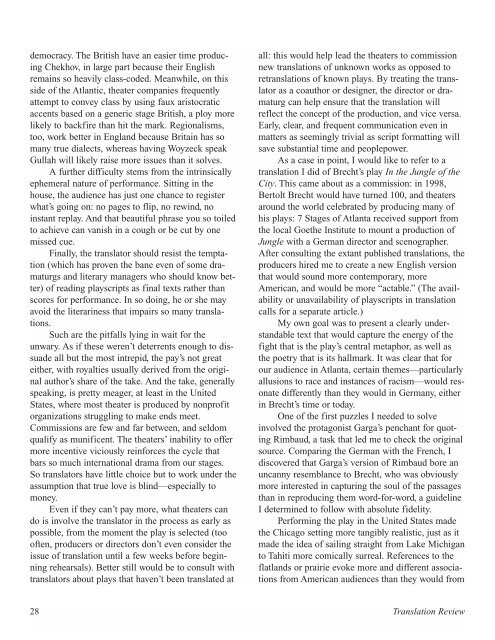Translation Review - The University of Texas at Dallas
Translation Review - The University of Texas at Dallas
Translation Review - The University of Texas at Dallas
You also want an ePaper? Increase the reach of your titles
YUMPU automatically turns print PDFs into web optimized ePapers that Google loves.
democracy. <strong>The</strong> British have an easier time producing<br />
Chekhov, in large part because their English<br />
remains so heavily class-coded. Meanwhile, on this<br />
side <strong>of</strong> the Atlantic, the<strong>at</strong>er companies frequently<br />
<strong>at</strong>tempt to convey class by using faux aristocr<strong>at</strong>ic<br />
accents based on a generic stage British, a ploy more<br />
likely to backfire than hit the mark. Regionalisms,<br />
too, work better in England because Britain has so<br />
many true dialects, whereas having Woyzeck speak<br />
Gullah will likely raise more issues than it solves.<br />
A further difficulty stems from the intrinsically<br />
ephemeral n<strong>at</strong>ure <strong>of</strong> performance. Sitting in the<br />
house, the audience has just one chance to register<br />
wh<strong>at</strong>’s going on: no pages to flip, no rewind, no<br />
instant replay. And th<strong>at</strong> beautiful phrase you so toiled<br />
to achieve can vanish in a cough or be cut by one<br />
missed cue.<br />
Finally, the transl<strong>at</strong>or should resist the tempt<strong>at</strong>ion<br />
(which has proven the bane even <strong>of</strong> some dram<strong>at</strong>urgs<br />
and literary managers who should know better)<br />
<strong>of</strong> reading playscripts as final texts r<strong>at</strong>her than<br />
scores for performance. In so doing, he or she may<br />
avoid the literariness th<strong>at</strong> impairs so many transl<strong>at</strong>ions.<br />
Such are the pitfalls lying in wait for the<br />
unwary. As if these weren’t deterrents enough to dissuade<br />
all but the most intrepid, the pay’s not gre<strong>at</strong><br />
either, with royalties usually derived from the original<br />
author’s share <strong>of</strong> the take. And the take, generally<br />
speaking, is pretty meager, <strong>at</strong> least in the United<br />
St<strong>at</strong>es, where most the<strong>at</strong>er is produced by nonpr<strong>of</strong>it<br />
organiz<strong>at</strong>ions struggling to make ends meet.<br />
Commissions are few and far between, and seldom<br />
qualify as munificent. <strong>The</strong> the<strong>at</strong>ers’ inability to <strong>of</strong>fer<br />
more incentive viciously reinforces the cycle th<strong>at</strong><br />
bars so much intern<strong>at</strong>ional drama from our stages.<br />
So transl<strong>at</strong>ors have little choice but to work under the<br />
assumption th<strong>at</strong> true love is blind—especially to<br />
money.<br />
Even if they can’t pay more, wh<strong>at</strong> the<strong>at</strong>ers can<br />
do is involve the transl<strong>at</strong>or in the process as early as<br />
possible, from the moment the play is selected (too<br />
<strong>of</strong>ten, producers or directors don’t even consider the<br />
issue <strong>of</strong> transl<strong>at</strong>ion until a few weeks before beginning<br />
rehearsals). Better still would be to consult with<br />
transl<strong>at</strong>ors about plays th<strong>at</strong> haven’t been transl<strong>at</strong>ed <strong>at</strong><br />
all: this would help lead the the<strong>at</strong>ers to commission<br />
new transl<strong>at</strong>ions <strong>of</strong> unknown works as opposed to<br />
retransl<strong>at</strong>ions <strong>of</strong> known plays. By tre<strong>at</strong>ing the transl<strong>at</strong>or<br />
as a coauthor or designer, the director or dram<strong>at</strong>urg<br />
can help ensure th<strong>at</strong> the transl<strong>at</strong>ion will<br />
reflect the concept <strong>of</strong> the production, and vice versa.<br />
Early, clear, and frequent communic<strong>at</strong>ion even in<br />
m<strong>at</strong>ters as seemingly trivial as script form<strong>at</strong>ting will<br />
save substantial time and peoplepower.<br />
As a case in point, I would like to refer to a<br />
transl<strong>at</strong>ion I did <strong>of</strong> Brecht’s play In the Jungle <strong>of</strong> the<br />
City. This came about as a commission: in 1998,<br />
Bertolt Brecht would have turned 100, and the<strong>at</strong>ers<br />
around the world celebr<strong>at</strong>ed by producing many <strong>of</strong><br />
his plays: 7 Stages <strong>of</strong> Atlanta received support from<br />
the local Goethe Institute to mount a production <strong>of</strong><br />
Jungle with a German director and scenographer.<br />
After consulting the extant published transl<strong>at</strong>ions, the<br />
producers hired me to cre<strong>at</strong>e a new English version<br />
th<strong>at</strong> would sound more contemporary, more<br />
American, and would be more “actable.” (<strong>The</strong> availability<br />
or unavailability <strong>of</strong> playscripts in transl<strong>at</strong>ion<br />
calls for a separ<strong>at</strong>e article.)<br />
My own goal was to present a clearly understandable<br />
text th<strong>at</strong> would capture the energy <strong>of</strong> the<br />
fight th<strong>at</strong> is the play’s central metaphor, as well as<br />
the poetry th<strong>at</strong> is its hallmark. It was clear th<strong>at</strong> for<br />
our audience in Atlanta, certain themes—particularly<br />
allusions to race and instances <strong>of</strong> racism—would reson<strong>at</strong>e<br />
differently than they would in Germany, either<br />
in Brecht’s time or today.<br />
One <strong>of</strong> the first puzzles I needed to solve<br />
involved the protagonist Garga’s penchant for quoting<br />
Rimbaud, a task th<strong>at</strong> led me to check the original<br />
source. Comparing the German with the French, I<br />
discovered th<strong>at</strong> Garga’s version <strong>of</strong> Rimbaud bore an<br />
uncanny resemblance to Brecht, who was obviously<br />
more interested in capturing the soul <strong>of</strong> the passages<br />
than in reproducing them word-for-word, a guideline<br />
I determined to follow with absolute fidelity.<br />
Performing the play in the United St<strong>at</strong>es made<br />
the Chicago setting more tangibly realistic, just as it<br />
made the idea <strong>of</strong> sailing straight from Lake Michigan<br />
to Tahiti more comically surreal. References to the<br />
fl<strong>at</strong>lands or prairie evoke more and different associ<strong>at</strong>ions<br />
from American audiences than they would from<br />
28 <strong>Transl<strong>at</strong>ion</strong> <strong>Review</strong>

















